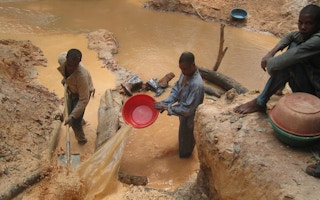Renewable energy companies are falling short on efforts to safeguard the rights of workers and communities in their operations and throughout mineral supply chains, placing the sector’s legitimacy and the global clean energy switch at risk, a new analysis released on Monday (29 June) has found.
To continue reading, subscribe to Eco‑Business.
There's something for everyone. We offer a range of subscription plans.
- Access our stories and receive our Insights Weekly newsletter with the free EB Member plan.
- Unlock unlimited access to our content and archive with EB Circle.
- Publish your content with EB Premium.
The report, by international non-governmental organisation Business & Human Rights Resource Centre, reveals that most clean energy firms analysed lack essential policies and practices to avert, identify and remedy human rights abuse, with hundreds of cases—including killings, threats and land seizures—documented over the last decade.
The study ranked the world’s 16 biggest publicly traded wind and solar companies on their alignment with the United Nations Guiding Principles on Business & Human Rights, a set of guidelines for nations and firms to protect rights. It finds that nearly half of the firms surveyed scored below 10 per cent on respecting human rights, with three quarters receiving ratings below 40 per cent.
The analysis comes as the coronavirus pandemic rages around the globe, prompting governments to devise stimulus plans to reboot shattered economies. In the report’s foreword, Mary Robinson, adjunct professor for climate justice at Trinity College Dublin and former President of Ireland, calls for a green recovery from the crisis that “tackles climate change and builds a more just and equitable society”.
“The climate crisis will not be averted without a rapid expansion of the renewable energy industry,” she writes. “However, a net-zero carbon future can and must go hand in hand with sustainable development, poverty reduction and reducing inequality. Putting people and their rights at the centre of the renewable energy business ensures we leave no one behind.”
“
We need clean energy that respects human rights.
Mary Robinson, adjunct professor, climate justice, Trinity College Dublin, former President of Ireland
She cautioned that a narrow focus on short-term profits that disregards harm to people and the environment had led fossil fuel companies to lose their legitimacy and social licence to operate. To allow renewable energy firms to follow in their footsteps would be to hamper the world’s low-carbon shift. “We need clean energy that respects human rights,” she said.
Marti Flacks, deputy director at Business & Human Rights Resource Centre, said corporates must clean up their act by carrying out human rights due diligence that responds to the risks their operations pose. This means they need to ensure they adopt and effectively implement human rights policies, engage with affected communities, uphold labour rights and monitor supply chains.
Financiers and policymakers, too, must play a role. Robinson said: “Investors should set a clear expectation that companies’ respect for human rights and meaningful engagement with communities is not optional, and they must challenge companies that are doing too little. Governments must bring in legislation that tackles the climate crisis and lifts the floor of corporate behaviour while ensuring their own funding for clean energy and energy access considers human rights implications.”
On par with other high-risk sectors
The study shows the industry’s explosive growth over the last ten years has brought about a rise in human rights violations linked to clean energy firms, with at least 197 allegations recorded since 2010 and 40 last year alone.
Charges have been made in every region and across all renewable energy sectors, including wind, solar, bioenergy, geothermal, and hydropower. The continent that chalked up the highest tally of cases is Latin America. Business & Human Rights Resource Centre has asked 129 companies to respond to the allegations.
Eight of the 16 corporates ranked in the new benchmark—the first-ever analysis to rate renewable energy companies on their human rights performance—have allegations of abuse linked to their operations. No company scored above 53 per cent, and even the highest-scoring corporation—Spanish utility firm Iberdrola—has had complaints lodged against it.
Higher-scoring companies also include European firms Acciona, Orsted and Enel. North American companies BlackRock, Brookfield, NextEra and The Southern Company ranked bottom, just ahead of Chinese firms China General Nuclear Power Corp and Power Construction Corp of China. Other European corporations such as EDP, EDF Energy, Engie, E.ON and RWE as well as Chinese firm Jinko Solar nestle between the two groups.
On policy commitments, human rights management systems, grievance mechanisms designed to address adverse impacts and other core indicators of basic human rights obligations, the companies’ average score—35 per cent—was on par with other sectors riddled with exploitation such as apparel, agribusiness and extractive industries.
The most pressing concern facing the industry, however, is its failure to curb the widespread practice of land grabbing and shield indigenous groups from harm. Allegations of land rights violations are among the most frequently reported cases in the renewable energy sector, yet not one company scored points for having policies to respect such rights, govern processes of land acquisition, or on just and fair relocation of residents.
Only one firm had made a public commitment on indigenous rights, and none have commitments in place to protect the rights of environmental defenders, even though clean energy was the industry with the fourth-highest number of allegations of attacks on activists last year.
Flacks observed such disregard could cost companies dearly. Where businesses hurt communities, disputes can flare up, threatening to delay projects and entail heavy financial costs. He said to ensure the clean energy transition is fast as well as fair, corporates must urgently make improvements. “Best practice exists and should be followed,” he added.








